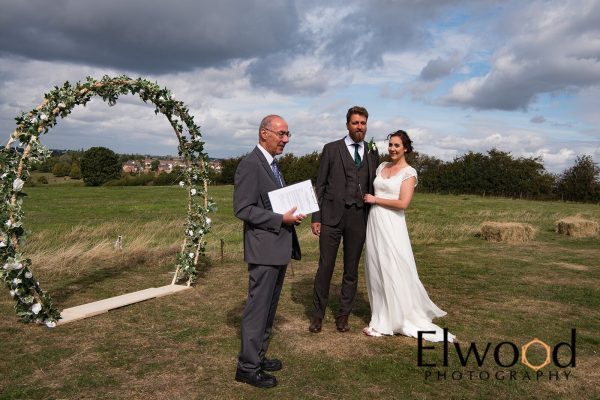
by Michael | Aug 10, 2020 | Blog
A traditional full religious service still suits many – although fewer than it used to.
A register office service is limited, not least because it is standardised and barely differs from one couple to the next.
So a lot of people are looking to personalise their wedding ceremony.
Venue
Apparently,
some 16% of UK weddings in 2019 were held in a rustic or woodland setting. Warehouses
(where you’ve got a blank canvas to work from) are gaining in popularity. And
then there are marquees and beaches, not to mention old favourites like hotels
and castles.
You may be taking a gamble with our notorious British climate, but you have a huge range of options as regards venue. Even allowing for social distancing.
Décor
Another way to individualise your wedding is the décor. It can be handmade or simply bear your stamp, offering unique designs. This can apply to invitations, seating plans and general signage.
Flowers
An obvious
way to show individuality and to beautify proceedings is with a show of flowers.
This can extend to a floral arch (as in the photo by Elwood Photography above)
or simply to bridal bouquets and table furnishings.
Attire
Then, of course, there is no obligation to dress in traditional outfits these days. The bride doesn’t have to wear white; the groom may not wear a suit. However, they can each show originality and personality.
An
interesting touch can be small details like coloured socks or a special cravat
for the groom.
Ceremony
As a civil celebrant, I would say this, but the ceremony can be personalised to great advantage. There are lots of examples, but writing your own vows can be great. This is an opportunity to say some very moving things, but also display humour and affection.
There could also be a choice of ritual, and the whole service can reflect the couple’s personalities and beliefs and be very special.
All of this,
especially preparing the ceremony, is something I can readily help you with.
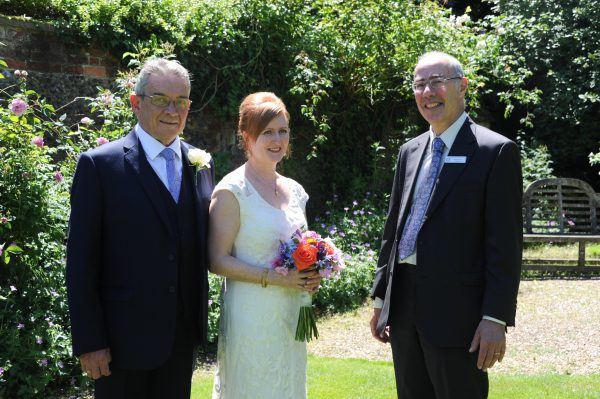
by Michael | Jul 21, 2020 | Blog
When I say “when?”, I mean the time of day or season. This is not a marriage guidance column. Let’s get that straight from the outset.
And we’re not talking about religious weddings that won’t take place on a Sunday, if Christian, or a Saturday, if Jewish. And so on.
Register Office
To marry at a Register Office, you need to make an appointment and go down (with two witnesses) on a working day.
By arrangement, the registrars will come out to certain venues, provided certain criteria are met and extra fees are paid. This will often include weekends.
Such weddings have to take place between 8 a.m. and 6 p.m.
At the time of writing, however, registrars may not be coming out.
Alternative Ceremonies
You can hold any other ceremony when you want (within reason). Obviously, you have to respect opening times and conditions of any venue you use. You might book a hotel, castle or stone circle.
Avoid High Season
Public holidays are an expensive time to arrange your event. Staff have to be paid extra. You also have to consider that certain times may be difficult for your guests.
Theoretically, you could marry on Christmas Day, but remember that guests might want to spend such a day with their family. Moreover, public transport would be minimal, at best, and costs would escalate, as staff would be paid overtime rates or be difficult to source.
Bear in mind that summers are always popular with people booking holidays, so get your invitations in quick! Summers don’t guarantee good weather, but the chances are reasonable that your big day will be sunny. Summer is therefore a popular time to book weddings, and prices tend to reflect that!
You can sometimes wangle a reduction, if you hold the event in the morning or afternoon.
Another expensive date is Valentine’s Day.
Finally, Fridays and, especially, Saturdays are likely to be most expensive (most popular, again). Remember, though, that if you book another, cheaper day, and it’s a destination wedding, it culd force people to take a long time off work.
Summing up
You may need to do your due diligence, but there is quite a lot of flexibility, when it comes to choosing when you marry.
Take the above remarks into consideration. But, most important, remember that it is your big day, so your wishes are paramount.
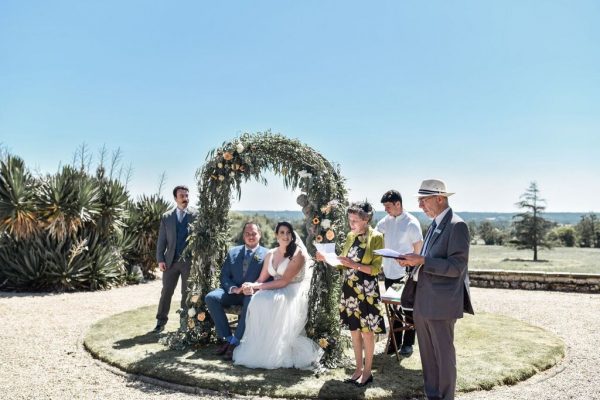
by Michael | Jul 22, 2019 | Blog
Apparently, one
of the first concerns of a couple is when they can get married.
By that I mean what day of the week or season they can marry in this country. Not the legal age for marriage.
Full religious
And let’s leave full religious weddings out of the mix. Just to say that Christian weddings will usually not take place on Sundays or Jewish ones on Saturdays. They may be possible on certain festivals, and not on others. Better not to get into all that!
Suffice it to say that your best bet is to approach your minister individually!
Register Office
If you’re
solely marrying at a Register Office, you must make an appointment. The two of
you need to go down, along with two witnesses, for the ceremony. This will
normally be on a working day (except on a Bank Holiday).
By
arrangement, the registrars will come out to certain venues, provided certain
criteria are met and extra fees are paid. This will often include weekends.
Such weddings
have to take place between 8 a.m. and 6 p.m.
Alternative Ceremonies
Any other ceremonies can be held at your discretion. If you are using a venue (such as a hotel, castle, stone circle), as long as you meet the venue’s conditions and you pay them (and any other suppliers, not least, the civil celebrant!), you have free choice.
You will
find that a public holiday will be a more expensive time for you, because staff
have to be paid extra. You may also find that certain holidays can cause
problems with guests. You could theoretically hold your wedding on Christmas
Day, but that would create a dilemma for many potential attendees, especially
families. It might also be difficult for venues to recruit staff then, or for
suppliers to come, as there would be no public transport. You might lose out
big time!
If booking
during the summer holidays, give guests plenty of notice (before they book
their holidays!).
Because
Summer is a popular time for weddings, prices can be higher than at
unfashionable times. Similarly, if you book your event for morning or
afternoon, you may be able to get your venue to budge on their price.
Avoid
Valentine’s Day too, if you want to cut costs.
Finally, returning
to the day of the wedding, Friday and, in particular, Saturday tend to be
dearest. Wednesdays, say, may be cheaper, but, if it was a destination wedding,
people would have to take a lot of time off work.
Summing up
There is considerable flexibility (if you do your homework). It is a fallacy that you have to marry at the weekend, although that remains the most popular time.
Take into consideration the issues mentioned above, but feel free to make your own decision. Your big day must be when you want it!
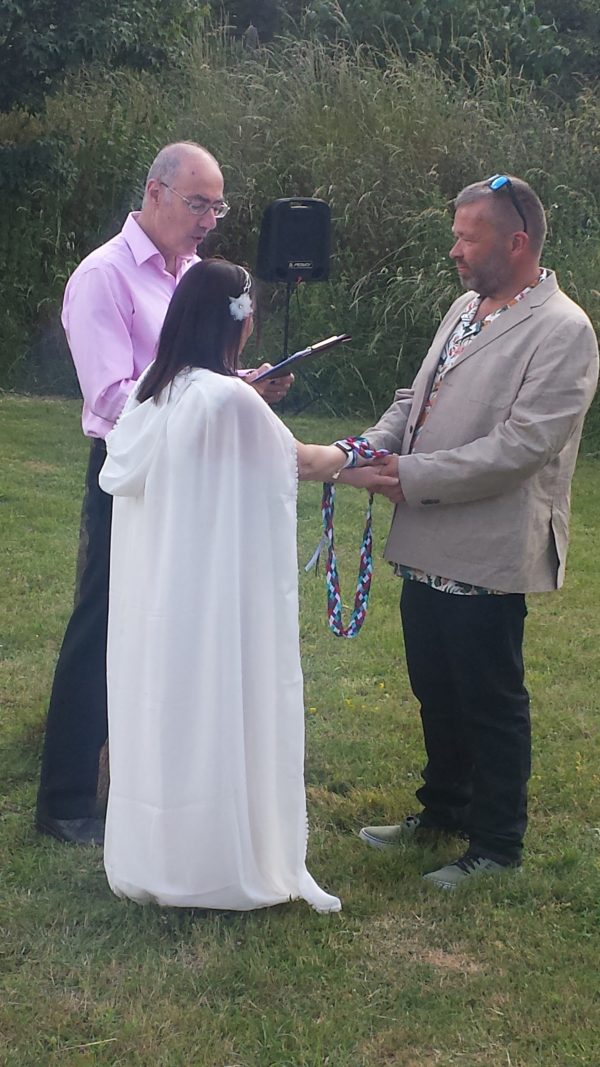
by Michael | Jan 28, 2019 | Blog
In my role as a civil celebrant, I meet a lot of people who have been fed myths about marriage options . My goal is to bust at least a few of them!
Myth no. 1
“You can
only marry in a church (or equivalent) or a register office.”
There are
actually three ways you can marry.
Firstly, through your church or synagogue etc. You will have a full religious ceremony, which will include the legal bits. There isn’t much opportunity for personalising the ceremony, though.
Secondly, through your Register Office. This ceremony will not include any religious references, let alone the name of God. Like the religious ceremony, it will not be very personal to you (if at all).
The Registrars will come out to a chosen venue, if you want – but this comes at quite a financial cost!
The third option is to use a civil celebrant. This ceremony can be totally unique to you, but it will not be legal. Usually, couples get legally married by the Registrar and then move on to have the ceremony of their dreams in front of their chosen guests, which the celebrant writes and conducts.
Myth no. 2
“You have to
marry in church or at the Register Office.”
Although
these options are of course available, as I have suggested above, these are not
the only possibilities. You can marry where you like (subject to payment,
permission or agreement!).
At present, the registrars will come out and conduct their ceremony anywhere, so long as there are four solid walls. (They charge quite a bit for this, as I have indicated.) Legislation may change to allow them to perform marriages in the open air too, but this is as yet uncertain.
At present, a civil celebrant can conduct a service anywhere, indoors or outdoors. The venue can vary considerably: I have officiated at the Savoy, Stonehenge, on an exposed hilltop with fabulous views, at a canal-side sanctuary, in a (glorious) back garden – and the list goes on! You are limited only by your imagination.
Myth No. 3
“You need to
take out a mortgage just to afford a wedding.”
Depending on the budget you have in mind, this may indeed not be a myth! However, as I suggest in a number of my blogs, there are ways to save money – eg https://vowsthatwow.co.uk/marriage-costs/
Obvious ways include reducing the guest list and choosing a modest venue. You can also save money by marrying out of season and even in the afternoon and midweek. Please glance through some of my suggestions.
A lot of people want to be married by a celebrant. They know they can’t dispense with the legal ceremony, and then realise they have to pay the Registrars and the Celebrant too. There is a way round this.
Go (by appointment) to the Register Office before the appointed wedding day (hours or even days before). Go with two witnesses, and you will be legally married. This will cost much less than paying the Registrars to come to your venue. The savings you make can go on hiring a celebrant for your tailor-made ceremony!
So you actually
have a lot more choice than you may have realised!
I hope this has been useful in pointing out what may not be obvious. If you have any enquiries, then do contact me. If you know of any other myths that need clarification, let me know and I’ll be glad not to have to think up another subject for a blog!

by Michael | Nov 5, 2018 | Blog
Mixed-faith ceremonies were virtually unthinkable a dozen years ago. Fortunately, we’ve moved on. They are much more accepted (and desired) nowadays.
Of course, there is a need. If a couple want to marry religiously, they may be prevented from so doing because of their church’s rules. So a Catholic divorcee will not be able to marry in Church. Same-sex ceremonies are still not accepted by many churches. Mixed-faith couples have the same problem, although some more enlightened institutions may be willing at least to bless the pair.
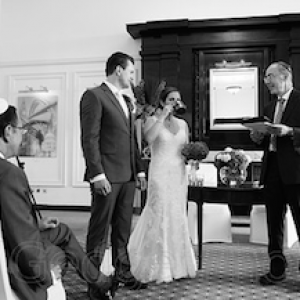 Photo: Philippa Gedge Photography
Photo: Philippa Gedge Photography
Not every mixed-faith couple wants any religion, and the Register Office may fill a gap. (Obviously, all marriages need to be registered officially in this country.) However, Register Office ceremonies are fairly standard and sometimes reek of the conveyor-belt.
An alternative can be a ceremony compiled and led by a civil celebrant (possibly, but not necessarily, a humanist). The celebrant can create a spiritual, beautiful ceremony – but such a ceremony does not have legal validity.
The Registrars’ service will be totally secular. There may be absolutely no religious mentions or readings, which may not meet the needs of the couple (or their families).
A civil celebrant will be able to meet the pair’s needs, if they want a part-religious ceremony. The celebrant may not be ordained, but can still include religious elements (usually agreed with the couple).
In fact, the civil celebrant will work with the couple to design the service that fits in with their beliefs. So it may be religious, part-religious or totally secular. It may contain rituals from a variety of religions and/or cultures.
The service will also be exactly as the couple want. It is up to them what clothes will – or will not – be worn (I have received special requests about my garb – but not, as yet, to wear a football shirt!). The couple can choose readings or poems, and also readers. There can be an address by the celebrant – checked in advance by the couple. They can have elements that they want, including the music, in the order that they want. (The celebrant may well offer advice.) They may choose to deliver their own vows. In short, absolutely everything can be approved by the couple before the day.
Logistically, there are a couple of decisions to be made.
- Should the register office ceremony take place a few hours – or a day or two – in advance? That way, the legal bit is covered by the time the couple come to the ‘real’ wedding ceremony, and they can relax and really enjoy their bespoke ceremony.
- Should the civil ceremony or blessing come straight after the legal marriage (at the same venue)? The ring blessing, for example, could be done by the civil celebrant, as could the vows. This way, the registrars could conduct a 10-15 minute ceremony, and the blessing ceremony could take around as long (depending), but cover the couple’s wishes.
The important thing on such a big day is to deliver a memorable, meaningful ceremony – one which the couple and their guests will remember fondly for months and years to come. By creating a personalised service and conducting it professionally, a good civil celebrant will ensure this.
Please ask Michael for more information.





